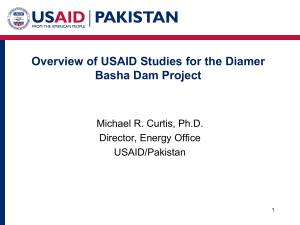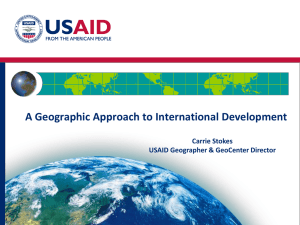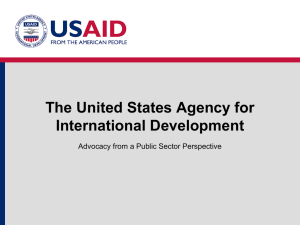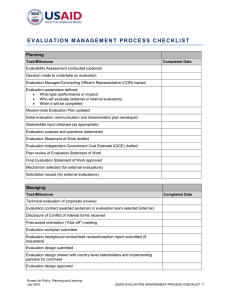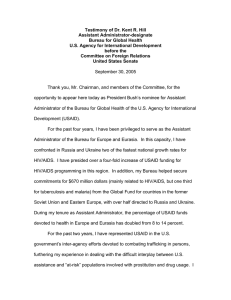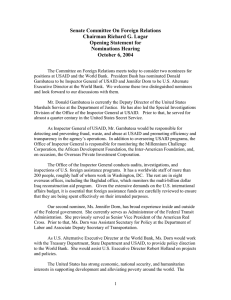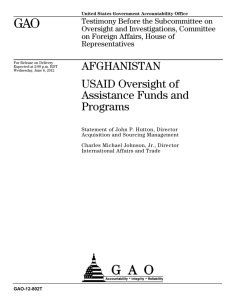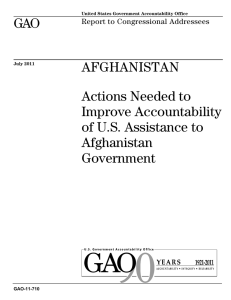Testimony of Randall Lee Tobias Administrator - designate before the
advertisement
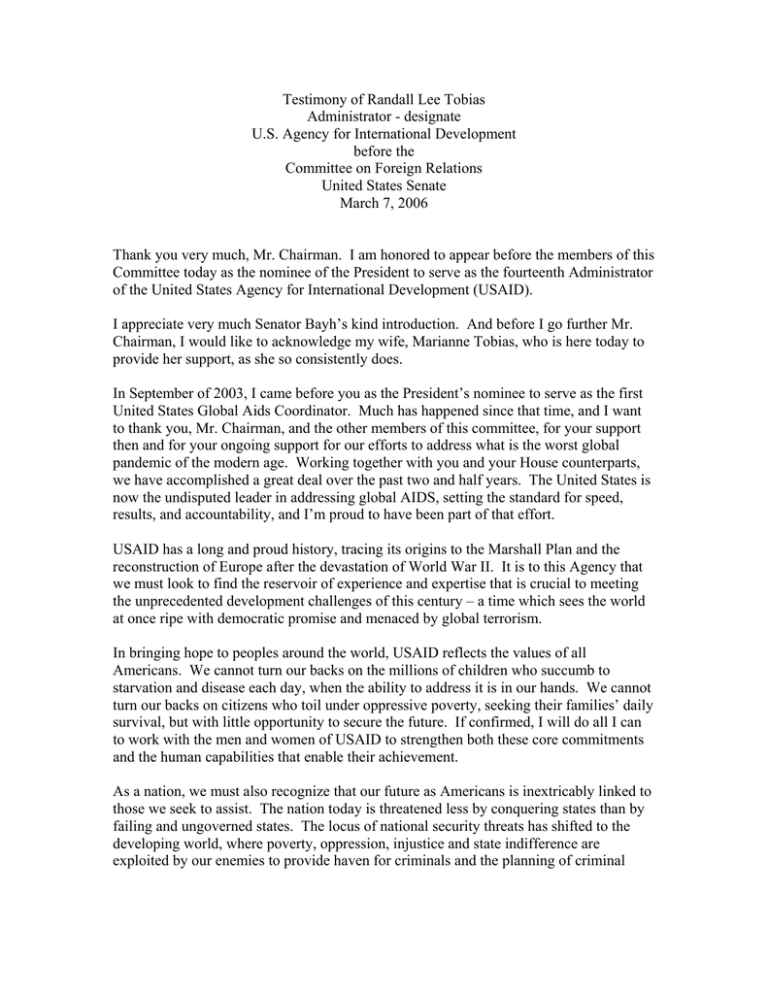
Testimony of Randall Lee Tobias Administrator - designate U.S. Agency for International Development before the Committee on Foreign Relations United States Senate March 7, 2006 Thank you very much, Mr. Chairman. I am honored to appear before the members of this Committee today as the nominee of the President to serve as the fourteenth Administrator of the United States Agency for International Development (USAID). I appreciate very much Senator Bayh’s kind introduction. And before I go further Mr. Chairman, I would like to acknowledge my wife, Marianne Tobias, who is here today to provide her support, as she so consistently does. In September of 2003, I came before you as the President’s nominee to serve as the first United States Global Aids Coordinator. Much has happened since that time, and I want to thank you, Mr. Chairman, and the other members of this committee, for your support then and for your ongoing support for our efforts to address what is the worst global pandemic of the modern age. Working together with you and your House counterparts, we have accomplished a great deal over the past two and half years. The United States is now the undisputed leader in addressing global AIDS, setting the standard for speed, results, and accountability, and I’m proud to have been part of that effort. USAID has a long and proud history, tracing its origins to the Marshall Plan and the reconstruction of Europe after the devastation of World War II. It is to this Agency that we must look to find the reservoir of experience and expertise that is crucial to meeting the unprecedented development challenges of this century – a time which sees the world at once ripe with democratic promise and menaced by global terrorism. In bringing hope to peoples around the world, USAID reflects the values of all Americans. We cannot turn our backs on the millions of children who succumb to starvation and disease each day, when the ability to address it is in our hands. We cannot turn our backs on citizens who toil under oppressive poverty, seeking their families’ daily survival, but with little opportunity to secure the future. If confirmed, I will do all I can to work with the men and women of USAID to strengthen both these core commitments and the human capabilities that enable their achievement. As a nation, we must also recognize that our future as Americans is inextricably linked to those we seek to assist. The nation today is threatened less by conquering states than by failing and ungoverned states. The locus of national security threats has shifted to the developing world, where poverty, oppression, injustice and state indifference are exploited by our enemies to provide haven for criminals and the planning of criminal acts. To counter these new threats, development assistance is now a foundational pillar of our new national security architecture. Central to the mission of development today is the advance of the President’s Freedom Agenda: promoting human rights, building the tools for democratic participation, strengthening government institutions and making them more accountable, fostering a free press, and enriching civil society and the associative life of nations. This includes laying the groundwork for economic growth, which undergirds democracy as it expands individual opportunity. Once perceived in narrow terms more akin to charity, we now understand that development is much more far reaching, indeed transformational. To be sure, Americans will always stand committed to feeding the world’s hungry and relieving suffering in regions of the world that face disaster. As the reaction to the Tsunami and the earthquake in Pakistan demonstrates, America responds, spontaneously and generously to humanitarian emergencies, through its government as well as privately. These commitments have not changed in the course of American history nor will they be shortchanged today. And USAID must continue to play a leading role in such efforts. But development must engender fundamental changes in governance and institutions, human capacity, and economic structure, so that countries can sustain their further economic and social progress on their own. “Results” and “sustainability” must be our guiding principals. USAID is already engaged in such efforts and, if confirmed, I look forward to drawing from the Agency’s best practices as we forge a path built on its successes. One excellent example of transformational development is a USAID program in Afghanistan. Afghanistan's maternal and child mortality rate is among the highest in the world, but the Taliban would not allow the training of new nurse-midwives. When the regime was ousted, only 537 skilled, trained nurse-midwives remained in the country of nearly 30 million. To address this problem, USAID, working with the Ministry of Public Health, is supporting a newly formed Afghan Midwives Association (AMA). Pashtoon Azfar, an Afghan woman and chairperson of the Association, is spearheading USAID's effort, working with the Institutes of Health Science in Kabul and the provinces. With its partners, the AMA has rehabilitated their schools of midwifery, implemented standardized midwifery curricula, and conducted clinical training courses for the staff of local organizations who, in turn, pass their expertise onto others. Under Pashtoon's leadership, the Afghan Midwives Association has tripled the number of trained nursemidwives in Afghanistan, creating employment opportunities and strengthening the country’s healthcare infrastructure. With the support of the Ministry of Public Health and USAID, the Afghan Midwives Association is expanding its membership and working to qualify for membership in the International Association of Midwives. But the benefits extend beyond even these measurable results. Within a cultural context that has long excluded women from educational and professional opportunities, these 2 successes have been achieved under a woman’s leadership, indicating what’s possible when women are empowered. In addition, the initiative is drawing government, local organizations and civil society together, practicing tools for democratic participation and collective problem-solving. As Pashtoon put it, "Afghanistan faces many problems. The path will not be easy, but if we travel it together, giving strength to one another, we can do so much more to help solve them." Those, like Pashtoon, working with us on the ground understand that the primary responsibility for development lies with host nations themselves. That said, the policies and corresponding assistance activities of the United States can and must play a vital and catalytic role in transformational development. As the first Coordinator for the President’s Emergency Plan for AIDS Relief, the largest international health initiative that any nation has ever launched to address a single disease, my consistent focus in fighting HIV/AIDS in over 120 countries has been on results and sustainability – providing both the necessary tools and the right incentives for host governments and citizens to take charge of the fight against HIV/AIDS. I’ve seen first-hand how efforts aimed at transformational development can achieve both short- and long-term results. Working with our host nation partners, we have responded to the immediate needs of the HIV/AIDS crisis, moving faster than any other bilateral or multilateral initiative to support nearly 500,000 people on treatment. At the same time, we recognize that in so many of the nations where we are working, health care systems are severely limited by a history of poverty and neglect, war and political instability. The ability to put resources to work is constrained by the lack of health care infrastructure and the absence of trained health workers. Without this local capacity, nations cannot fully own the fight, achieve results, and sustain responses for the long term. In the late 1980s, with support from USAID, the Indiana University Medical School and Moi University in Kenya began a partnership that led to the launch of a new Kenyan medical school. The Moi Medical School graduated its first class of physicians in 1997, thus growing Kenya’s capacity to serve its own people. In 2001 the partnership was expanded by establishing a joint program for the prevention and treatment of HIV/AIDS. This program, an implementing partner of the President’s Emergency Plan for AIDS Relief, has now established twelve adult and pediatric HIV/AIDS centers serving over 20,000 patients, with plans to reach 50,000 in the future. All of this is building the capacity for care in a network that spans much of western Kenya. Yet most impressive of all, and so critical to sustainability, these Kenyan patients are now largely being treated by Kenyan health care providers. And those Kenyan health care providers were largely trained by other Kenyans who are products of the IU-Moi partnership. These are Kenyans taking care of Kenyans. Beyond attention to the current health care crisis, what Kenya has needed most – what Africa needs most – is help in growing its own health care capacity. That’s exactly what this program is doing, while at 3 the same time delivering healing and hope. This is what transformational development is all about. The challenges we face today require a similar leadership and management approach to our foreign assistance. In places as diverse as Afghanistan and Kenya, our success will largely be determined by our ability to work in partnership with host country governments and civil society, using strategies that support transformation and sustainability. As the Global AIDS Coordinator, I have witnessed USAID’s work and its committed employees at their best, working tirelessly in some of the most difficult environments in the world. Should I be confirmed as Administrator, I look forward to working to enhance USAID’s role and its capabilities, and to bringing its development expertise to bear on the great challenges our nation and the global community face today. The men and women of USAID have been empowered to play a vital role on behalf of the people of the United States, not only in the alleviation of poverty and suffering, but in the realization of a hopeful, prosperous and peaceful future for all citizens of the global community. I would be proud to have the opportunity to serve alongside them. Thank you Mr. Chairman for the opportunity to appear before you and the members of this committee today. Should I be confirmed, I look forward to a continuation of our productive relationship. Quite simply, the success of the mission I’ve been asked to take on depends on working closely with the Congress, and I pledge to do just that. I will be happy to answer any questions you may have. 4


